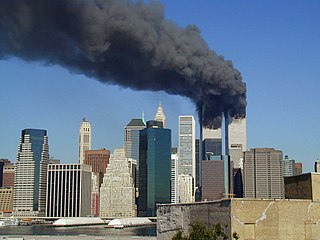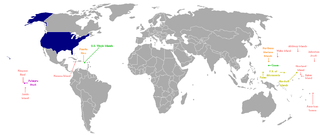
A United Nations Security Council resolution (UNSCR) is a United Nations resolution adopted by the Security Council (UNSC), the United Nations (UN) 15-member body charged with "primary responsibility for the maintenance of international peace and security".

United Nations Security Council Resolution 1373, adopted unanimously on 28 September 2001, is a counterterrorism measure passed following the 11 September terrorist attacks on the United States. The resolution was adopted under Chapter VII of the United Nations Charter, and is therefore binding on all UN member states.

United Nations Security Council resolution 1483, adopted on 22 May 2003, after recalling all previous resolutions on the situation between Iraq and Kuwait, the Council lifted trade sanctions against Iraq and terminated the Oil-for-Food Programme.
His Excellency Mahinda Buddhadasa Samarasinghe is a former MP and the current Ambassador of Sri Lanka to the United States and Mexico and High Commissioner to Trinidad and Tobago.
A Review Conference of the Rome Statute took place from 31 May to 11 June 2010, in Kampala, Uganda to consider amendments to the Rome Statute of the International Criminal Court. The Rome Statute established the International Criminal Court in 2002 as a permanent tribunal to prosecute individuals accused of the most serious crimes of international concern, and provided that a review conference be held seven years after the entry into force.
Trinidad and Tobago passports are issued to citizens of Trinidad and Tobago for international travel; allowing the passport bearer to travel to foreign countries in accordance to stipulated visa requirements. All Trinidad and Tobago passports are issued through the Ministry of National Security, Immigration Division and are valid for a period of ten years for adults, and five years for children under 16.

United Nations Security Council resolution 568, adopted unanimously on 21 June 1985, after hearing representations from Botswana, the Council condemned the Raid on Gaborone by South Africa, expressing its shock and indignation at the loss of life and damage to property and considered the attack as a "gross violation of the country's sovereignty and territorial integrity".

United Nations Security Council resolution 683, adopted on 22 December 1990, after recalling Resolution 21 (1947) which approved the Trusteeship Territory of the Japanese Mandated Islands as well as Chapter XII of the United Nations Charter which established the United Nations Trusteeship system, the council determined that, in the light of entry into force of new status agreements for the Federated States of Micronesia, the Marshall Islands and the Northern Mariana Islands, the objectives of the Trusteeship Agreement had been completed and therefore ended the Trusteeship Agreement with those entities.

United Nations Security Council resolution 942, adopted on 23 September 1994, after reaffirming all resolutions on the situation in Bosnia and Herzegovina, the Council reinforced measures relating to safe areas under control of Bosnian Serb forces.

United Nations Security Council Resolution 1931, adopted unanimously on June 29, 2010, after recalling resolutions 827 (1993), 1581 (2005), 1597 (2005), 1613 (2005), 1629 (2005), 1660 (2006), 1668 (2006), 1800 (2008), 1837 (2008), 1849 (2008), 1877 (2009), 1900 (2009) and 1915 (2010), the Council noted that the 2010 target for the completion of trials at the International Criminal Tribunal for the former Yugoslavia (ICTY) could not be met, and therefore extended the terms of 23 judges at the ICTY.

United Nations Security Council Resolution 1613, adopted unanimously on 26 July 2005, after recalling resolutions 827 (1993), 1166 (1998), 1329 (2000), 1411 (2002), 1431 (2002), 1481 (2003), 1503 (2003), 1534 (2004) and 1597 (2005), the Council forwarded a list of nominees for temporary judges at the International Criminal Tribunal for the former Yugoslavia (ICTY) to the General Assembly for consideration.

United Nations Security Council Resolution 1993, adopted unanimously on June 29, 2011, after recalling resolutions 827 (1993), 1503 (2003) and 1534 (2003), the Council extended the terms of office of 17 permanent and temporary judges at the International Criminal Tribunal for the former Yugoslavia (ICTY).
Trinidad and Tobago was admitted to the United Nations by the General Assembly on September 18, 1962, as advised by the United Nations Security Council Resolution 175.

The 1984 United Nations Security Council election was held from 22 October to 18 December 1984 during the Thirty-ninth session of the United Nations General Assembly, held at United Nations Headquarters in New York City. The General Assembly elected Australia, Denmark, Madagascar, Thailand, and Trinidad and Tobago, as the five new non-permanent members of the UN Security Council for two-year mandates commencing on 1 January 1985. Madagascar, Thailand and Trinidad and Tobago were elected to Council for the first time.

Elizabeth II was Queen of Trinidad and Tobago from the independence of Trinidad and Tobago on 31 August 1962 until the country became a republic on 1 August 1976. Her constitutional role as head of state was delegated to a governor-general, who acted on the advice of government ministers.
Malaysia became the 82nd member of the United Nations on 17 September 1957. Malaysia has held a rotational non-permanent seat on the United Nations Security Council for four terms, and has participated in over 30 United Nations peacekeeping missions through its MALBATT contingent since October 1960.

The Group of Latin America and Caribbean Countries, or GRULAC, is one of the five United Nations Regional Groups composed of 33 Member States from Central and South America, as well as some islands in the West Indies. Its members compose 17% of all United Nations members.

Sergiy Olehovych Kyslytsya is a Ukrainian career diplomat, who serves as Ambassador Extraordinary and Plenipotentiary of Ukraine and Permanent Representative of Ukraine to the United Nations. He had previously served as Deputy Minister of Foreign Affairs of Ukraine (2014–2019).
The Declaration on the Rights of Peasants is a United Nations General Assembly resolution on human rights with "universal understanding", adopted by the United Nations in 2018. The resolution was passed by a vote of 121-8, with 54 members abstaining.
Events in the year 2024 in the United Nations.











